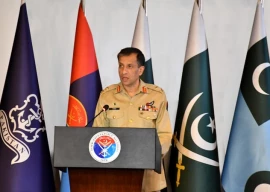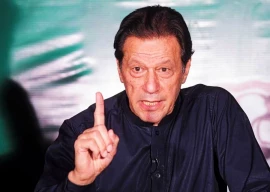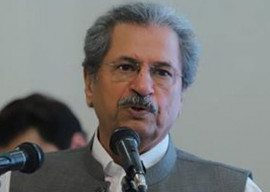
The Election Commission of Pakistan (ECP) has unveiled an ambitious strategic plan for the next five years, which aims at holding the 2018 general polls via Electronic Voting Machines (EVM) and completing the delimitation of constituencies through the Geographic Information System (GIS).
These are just a couple of the 160 objectives outlined under the 13 broader goals in the second Five-Year Strategic Plan (2014-2018).
However, most of the goals would depend on the will of the parliament, as legislative feedback would be required for implementation. In its draft shared with the media, the ECP has sought feedback from all stakeholders by May 15 before it is presented to the commission for final approval.
The new strategic plan comes at a time when the Pakistan Tehreek-e-Insaaf (PTI) and the Dr Tahirul Qadri led Pakistan Awami Tehreek (PAT) are set to launch a country wide protest campaign demanding reforms in the electoral system.
ECP had launched its first Five-Year Strategic Plan (2010-2014) in May 2010. In its draft ECP claimed that it achieved around 80% of the targets by the end of 2013.
Some of the landmarks included the preparation of electoral rolls with photographs and National Identity Card (NIC) numbers of registered voters, the use of magnetic ink for thump impressions of voters to verify the authenticity of a voter in case of complains, the setting up of full-time post-election tribunals, and the launching of the 8300 SMS service for voter verification.
The digital vote
Under the new strategic plan, the election authorities will use EVMs as a pilot project in the by-elections this year. The commission plans to roll out these machines throughout the country by mid-2017 so that they can be used in the next general elections due in 2018.
Before introducing the digital vote, the parliament needs to make amendments in the Representation of Peoples Act (ROPA) 1976, an ECP official explained. “The parliament would have to amend clauses pertaining to the procedure to cast the vote in the ROPA. We’d [rather] propose a dual system where we have both the options of voting manually and electronically,” he told The Express Tribune.
But it’s costly business. It is estimated that each EVM at the current rate would cost around Rs40,000. The ECP would need around 200,000 such machines for the next general polls – at least one for each polling booth. ECP officials said they want to procure EVMs that should have an inbuilt biometric voter identification system.
Delimiting constituencies
To avoid gerrymandering – the practice of drawing boundaries of constituencies to establish political advantage for a group, the ECP plans to delimit constituencies by using the Geographical Information System (GIS). However, new delimitations are conditional to a fresh population census, which is due since 2008. ECP in its strategic plan has once again asked the government to complete fresh census by next year.
The national and provincial assembly constituencies were delimited in 2002 on the basis of the 1998 population census. The 2008 general elections and the 2013 polls were conducted on the basis of 2002 delimitations. New census would result into increase of number of seats in the legislatives in accordance with the ratio of population increase.
A more autonomous body
In its proposed plan, the ECP has sought more financial and administrative autonomy – an ambitious demand that would again depend on the will of the Parliament. The election authorities want to have a complete control over the conduct of the polls to ensure that their orders are properly implemented.
“In case of a complaint against a bureaucrat using his influence in favour of someone, we can only recommend the relevant provincial or central government to change him. We cannot take any action directly. These issues need to be addressed through changes in the law,” the ECP official said.
Interestingly before the May 11, 2013 general elections, the ECP had sent similar proposals to parliament which constituted a committee to look into them. However, nothing concrete came out of the parliamentary committee as far as changes in legislation were concerned.
Government officials on election duties
In its new plan, the ECP has decided to make a permanent pool of government officials to perform election duties. These officials from various federal and provincial departments would be given training, while the ECP also plans to develop mechanisms to evaluate the performance these officials.
Similarly, ECP plans to set up proper offices of its own in every district, fully equipped with human and financial resources. Currently, ECP hires services of different government departments, mostly teachers, for election duties and other election related matters including enumeration of voters.
Campaign finance
The draft reforms package also delineated proposals to improve the system of political finance where every registered political party would have to make sure that they conduct all their activities through a bank account and records of these would be shared with the commission.
Gender issues
The plan also proposes various measures to increase participation of women in the electoral process.
A version of this story was published earlier in The Express Tribune, April 30th, 2014.
COMMENTS (1)
Comments are moderated and generally will be posted if they are on-topic and not abusive.
For more information, please see our Comments FAQ










1721576508-0/drake-(2)1721576508-0-270x192.webp)







I dint trust ECP. They do not force the government to have a full time head and not an acting one, they cant do much and i am not sure even if they want to